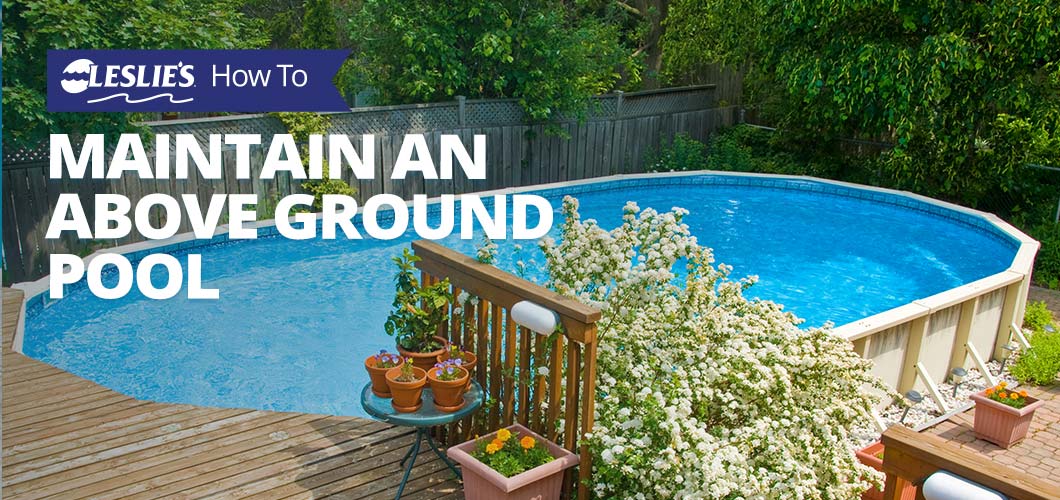
How to Maintain an Above Ground Pool
What does it take to maintain an above ground pool? Learning how to care for an above ground pool is very similar to caring for an inground pool, but with a few minor differences. For one, the size of the pool and the equipment capacity is often much less than an inground pool. Also, all steel above ground pools are technically vinyl liner pools, meaning you’ll have to take special care to preserve and protect your pool liner. It’s really not too hard to care for an above ground pool. We have a few tips to help you keep the water swim-ready all summer long.
Run the Pump and Filter Daily
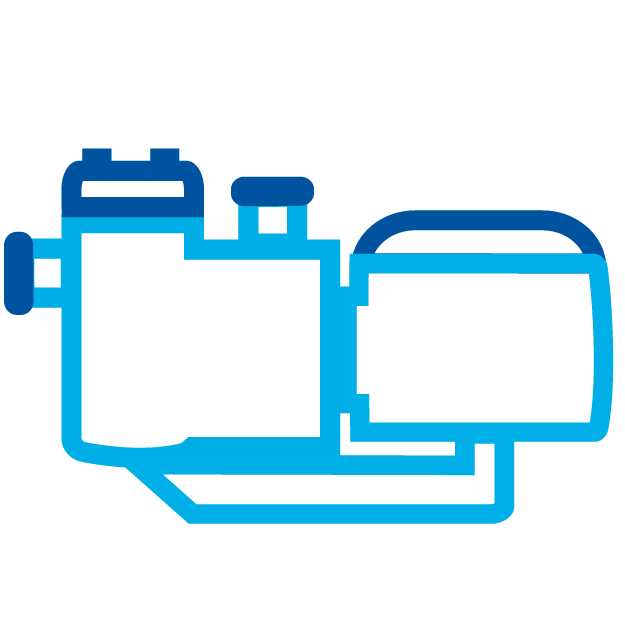
The filter pump needs to run for the proper amount of time every day. Running the pump circulates the water and sanitizer, and pushes water through the filter to remove small particles of debris and other contaminants. If the pump does not run long enough each day, it becomes harder to maintain the clarity of your above ground pool water.
In many cases, above ground pools come with a pump and filter that are only adequate, and may need to run 24 hours per day to properly circulate and filter the pool. Larger and more efficient above ground filter systems can run less – usually 12-16 hours daily during peak pool season, or 8-12 hours a day during cooler periods. To figure out the correct pump run time for your system, the rule of thumb is to move all water in the pool through the filter at least once per day, or more during periods of hot weather.
Test and Balance Pool Water 2-3 Times per Week
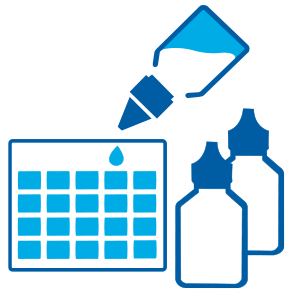
Using a test kit or test strips, test your water at least 2 or 3 times each week, then make adjustments as needed with water balancing chemicals. Test for pH and Free Available Chlorine often, as they tend to fluctuate more quickly than other chemicals. Add pH Increaser or pH Decreaser to keep pH levels between 7.4 - 7.6. Keep Free Available Chlorine levels between 2.0-4.0 ppm, and shock the pool if you need to bring the levels up, or if this number differs from Total Available Chlorine levels. Total Alkalinity should stay between 80-120 ppm to help buffer pH levels.
Shock the Pool Once per Week

In order to maintain an above ground pool, you have to make sure the water is sanitary. Shocking, also referred to as super-chlorinating or oxidizing, consists of adding a large dose of granular chlorine, liquid chlorine, or non-chlorine shock to the pool. This is done to remove both visible and invisible contaminants, such as algae, germs, and combined chlorine. Follow package directions to ensure proper handling and dosage.
BONUS TIP: For granular chlorine shock, be sure to pre-dissolve it in a bucket of clean water before pouring into the pool. This protects the floor of your pool liner and helps prevent bleaching and discoloration. Always carefully read and follow product label instructions.
Bring a Pool Water Sample to Leslie’s Each Month
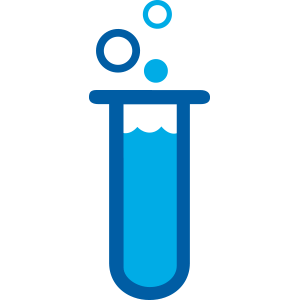
Take a clean pool water sample to any Leslie’s store to take advantage of our free AccuBlue® pool water test at least once per month. Using industry-leading proprietary technology, it only takes about a minute to get precisely accurate results for 10 different aspects of water chemistry. Based on a few questions about your pool type and size, the complete results and a customized treatment report will be printed for you. It’s completely free – no purchase necessary! There’s no better way to keep track of the health of your pool.
Clean the Pool Weekly
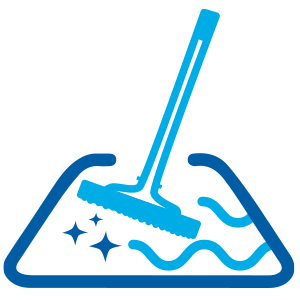
Keeping a clean pool will help avoid stains on the pool liner, and will reduce the negative effect debris has on pool water chemistry and sanitizer levels. Besides, no one wants to swim in a dirty pool! For best results, use your pool cleaning tools to thoroughly clean the pool at least once a week, or more often if needed. First, remove floating debris with a leaf net. Next, vacuum the floor of the pool to remove dirt and sunken debris. Finally, brush all pool surfaces, including behind the ladder, to keep your pool spotless. Remember to clean the pool filter according to manufacturer recommendations. In most cases, you should clean the pool filter when the pressure gauge reads about 8-10 psi higher than the clean or starting pressure. It’s also important to regularly empty the pump basket and skimmer basket to help your pump work efficiently.
Add Algaecide and Clarifier
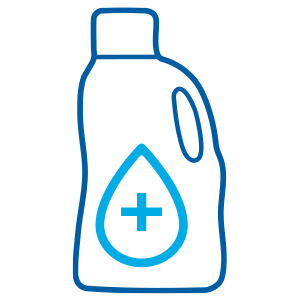
A good quality algaecide, such as Leslie's Algae Control or Copper Algaecide, works with your chlorine to prevent and eliminate algae before it blooms out of control. Algaecide destroys the protective outer layers of an algae cell, allowing chlorine to penetrate to the nucleus and destroy it. Clarifier is a coagulant, which attracts very tiny particles together into larger, more easily filtered clumps. Using a pool clarifier, such as Leslie's Ultra Bright Advanced, will help boost filter efficiency, reduce sanitizer workload, and help keep your water crystal clear. These two chemicals can significantly help you as you work to maintain your above ground pool.
Deep Clean Your Pool Filter
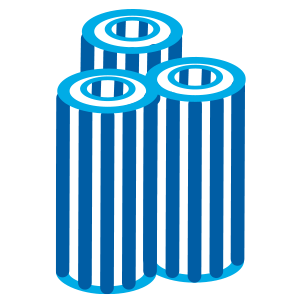
Using a pool filter cleaner removes oils and mineral scale from sand and cartridge pool filters. Used regularly, Sand Filter Revitalizer or Cartridge Cleaner improves the dirt trapping ability of your filter, and extends the lifespan of your filter media. At some point, however, your filter media (filter sand or filter cartridges) will require replacement. This happens more often for filters that are small or marginal in size. Pool filter cartridges for above ground pools are typically only good for about one or two seasons. Filter sand usually lasts for three to five years.
Avoid Draining the Pool Completely
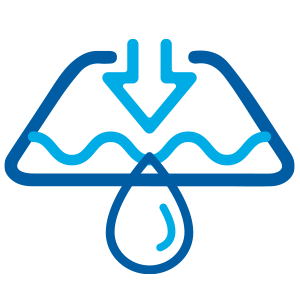
If you find yourself with extremely poor water conditions – which can take a large amount of chemicals and weeks of filtering – in some cases, it may be wise to replace most of the water in the pool. Before considering this as an option, consult your local pool professional. You can use a submersible pump to remove water from the pool. However, always leave at least 6" of water or more to support the structure and keep the pool liner stretched into place. Only drain the pool completely if you are replacing the pool liner.
No Non-Pool Toys Allowed!
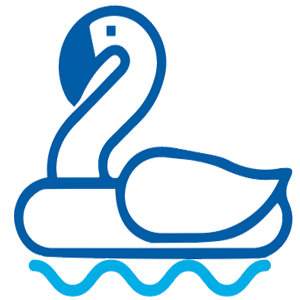
To maintain and protect your above ground pool liner, as well as prevent stains and tears, establish a pool rule that only pool toys are allowed in the pool. No skateboards, Barbie dolls, Nerf guns, or Hot Wheels cars. Treat your pool liner with care, both physically and chemically, and it will stay looking good for many years. Check out our Pool Lifestyle section for fun pool toys, games, floats, and other summertime accessories.
Off-Season Pool Care

Winter pool care is important to protect your pool. In cold climates, the pool will freeze solid. To support the ice sheet, it is crucial to make sure that the pool is not leaking during this time. A good winter cover, cover pump, air pillow, and pool closing chemical kit is also important to keep your pool safe through the winter. Sunbelt pools without heavy freezing can run the pool as normal, although daily filter times can be reduced once water temperature drops below 65ºF. For more information on pool winterization, see our Pool Closing blog category.
If you’re a first time pool owner, maintaining your above ground pool can seem daunting at first. But taking care of your pool will become familiar in time, and soon it will only take about an hour a week to keep the pool in tip top shape. If you have questions along the way, or if you run into water quality issues, call or visit any Leslie's store for personalized, expert advice.